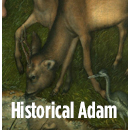Editor's Note: The following piece by John Walton concludes the first round of our symposium on the historical Adam. (Links to the preceding pieces are provided below.) Next Monday we will be begin posting the second and concluding round, in which participants in the symposium respond to the discussion so far.
Our understanding of Adam and Eve and human origins must begin by a careful reading of the text of Genesis as an ancient Near Eastern document. Given the belief that God vested his authority in the human narrator, the narrator's communicative intentions carry authority even as they operate in the language and culture of the ancient world. As we engage in such a contextual reading, we must be particularly interested in determining the extent to which the biblical claims may or may not conflict with the claims made in the current scientific consensus about human origins. We should studiously avoid imposing either scientific or ancient Near Eastern claims on the Bible. Instead we want to assess the biblical claims independently and only then compare them to what we find in other ancient Near Eastern literature and to the evidence suggested by scientific findings. We expect Genesis to be characterized in part by perspectives that are found in the literature of the ancient Near East, because God was communicating into an ancient Near Eastern culture: ancient Israel. We also expect Genesis, read properly, to be compatible with the truths about our world that scientists uncover, because both the world and the Word emanate from God. Information from the ancient Near East or information from scientific discovery may at times prompt us to ask questions of the text that we have not thought to ask before.
In my view, Genesis 2 tells of the establishment of a terrestrial center of sacred space in what is identified as a garden where Adam and Eve are commissioned as priests to serve in sacred space, mediating revelation of God and access to God. Adam and Eve are presented as archetypes in their formation: they embody all people, and the affirmations of the forming accounts are affirmations made of everyone, not uniquely of them. All humans are made of dust; womankind is from the side of mankind. Adam and Eve are also established as priestly representatives through whom life and wisdom can be achieved as people are drawn into relationship with God. Unfortunately they failed to achieve these benefits because they opted to position themselves as the center of order (and in so doing becoming like God) in place of God.
The fact that ancient Near Eastern texts also feature an archetypal view of human origins helps us to recognize that this way of thinking would not be unusual for Israelites in their cultural context. At the same time, the message to be found in the archetypal presentation in Genesis is of a totally different sort than what is found elsewhere in the ancient Near East. These points, in turn, constitute the main teaching of Genesis 2. They convey important ideas about the nature of God, the nature of humanity, and both horizontal and vertical relationships.
Once the forming accounts are recognized as archetypal, they cease to be meaningful in terms of material human origins. Nevertheless, I have identified in the text evidences that the Israelites as well as the NT authors believed Adam and Eve to be real people who lived in a real past. The question to be asked, however, is whether this belief is simply cultural and therefore not binding. The hermeneutical principle that I use to make that determination is whether the text hangs theology on the belief. For example, in the ancient world they believed that the heart was the center of intellect and emotion and the text affirms that belief. But no theology is built on it and, therefore, once that is recognized as simply a cultural way of thinking in the ancient world rather than the inspired, authoritative revelation of God, I can safely set aside that ancient belief.
So the question is whether theological teachings are derived from the historicity of Adam and Eve. On this question we can draw a distinction between the theology connected to the doctrine of Scripture and other doctrines. The argument is weak that contends the genealogies indicate that Adam really existed and therefore it is a matter of inerrancy to believe that he did. This is not a case of hanging theology on historical Adam. If we were to contend that belief in a historical Adam was cultural, not affirmed in the theological, revelatory intent of the text but just part of the framework of communication, then inerrancy would not apply.
We must then consider whether theological assertions other than inerrancy are intertwined with the historicity of Adam. The primary (and some would contend, the only) theological discussion in the Bible that relies on a historical Adam is the theology of the Fall; particularly, the idea that sin (or at least accountability for sin) entered the cosmos at a specific moment due to a specific act, and that through that act we all became subject to sin and its consequence, death. Thus the historicity of Adam finds its primary significance in the discussion of the origins of sin, rather than the origins of humanity.
I consider it likely that humanity was created en masse in Genesis 1, that the presence of other people is assumed in Genesis 4, and that Genesis 2 does not intend to offer an account of biological human origins. If no theology is dependent on or derived from the traditional assertions of de novo creation or Adam and Eve as the first two humans, alone in the world, and the direct progenitors of the entire human race, and exegetical analysis offers plausible alternative interpretations, we have no reason to be committed to those beliefs; inerrancy and the text would not demand them from us and we hold them by our preference. If it turns out (as I believe it does) that science offers evidence to the contrary, we are free to consider it. In other words, if neither exegesis nor theology demands those conclusions that argue against the modern scientific consensus premised on common descent, we have no reason to contest the science on biblical grounds. That does not mean that all our questions about human origins can now easily be answered.
We can contend that Adam and Eve are theologically and historically significant even if they were not the first humans. We can contend that Adam and Eve are appropriately positioned as fountainheads of humanity even if we are not all their direct biological descendants. We can contend that humanity has a distinct place in the created order, unique among species, even if Adam and Eve are not de novo creations.
The biblical text does not leave theological room for positions affirming God's occasional involvement in an otherwise natural process if they show no concern with human ontology and fail distinguish humans as distinct from animals any more than naturalistic evolution does. Simply popping in a human soul or the image of God is insufficient to distinguish human ontology—it is much more complex. The Bible more easily accommodates positions that maintain that even though there are material aspects of the process of development of humanity that can be deduced and charted, God's involvement is pervasive throughout and the essential connection between ontogeny and ontology is broken.
The most important affirmation that Christians should be making about human origins is that humans are ontologically distinct from other creatures, regardless of the biological processes leading to humans. Humans are not animals, even if they were created from animals. We deny that ontology derives from ontogeny; how we were made does not dictate what we are. Israelites descended from Amorites and Hittites (Ezekiel 16:3), but that is no true indication of who they are. They have been given a specific, unique ontology by virtue of election and covenant, which has nothing to do with their line of descent.
This article is part of our Symposium on the Historical Adam:

John H. Walton is a professor of Old Testament at Wheaton College in Illinois. His primary focus is on comparative studies of the Old Testament and the Ancient Near East. He has authored or edited dozens of books and articles, including his most recent publication, The Lost World of Adam and Eve: Genesis 2-3 and the Human Origins Debate (InterVarsity Press).
Preceding pieces in the first round of the symposium:
Peter Enns Karl Giberson Denis O. Lamoureux Hans Madueme Harry Lee "Hal" Poe John Schneider William VanDoodewaard
Copyright © 2015 by the author or Christianity Today/Books & Culture magazine. Click here for reprint information on Books & Culture.










